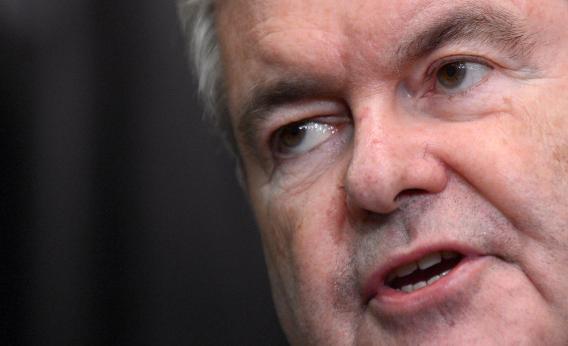Newt Gingrich arrived at the offices of the National Review a little after 8:30, climbing to the third floor office and then asking for black coffee.
“I’m slightly not awake yet,” he apologized, “because last night we watched an additional episode of ‘Downton Abbey.’ One of Callista’s girlfriends has sent her all three years. One night, the last week, we were up until 2 in the morning.” He asked a small group of reporters whether they’d taken an online test to see which “Downton” character they matched up with. “I cannot tell you quite how it came out, because I would get in enormous trouble with my wife.”
The Gingrich we all remember from the 2012 campaign was part cheerful and part apocalyptic, warning that America as we know it would be lost if Barack Obama won. The cheerful Gingrich now dominated, and he wanted to keep talking about the TV show.
“It’s a great study of plot,” he said. “They do something that I’ve never thought about before. There’s actually a lesson in this. ‘Downton Abbey’ has about 15 subplots plus four or five that come and go. At any given moment you could list these different developments going on with these different personalities. See, you’re never bored. It’s sort of MTV, designed into long form. Some of the shots are as short as 30 seconds. It’s very intelligently done, and I’m just really impressed.”
The thing about Gingrich, or any politician who has sparred with reporters at a high level for a long time, is that he knows how his comments might feed a story. He blew off an opening question about a BusinessWeek report that he and Rick Santorum had discussed a 2012 primary unity ticket. “Somebody who had an idea talked to somebody else who had an idea, and then they all got together and had ideas,” he said. He didn’t blink when asked about Mark Sanford’s comeback bid: Sanford’s affair would be “an issue,” and he heard that Sanford dealt with it very well. (Implication: Gingrich also knocked that question to the canvas when he was asked about his marital indiscretions in 2012.) His advice to Republicans who got questions about rape was basically to change the frame: “You have to be ready to block questions.” He sort of did this to me when I asked about gun laws—that’s for a later post—but what really stood out was the return of optimism. America was not doomed anymore. The acceptance of gay marriage wasn’t dooming anybody, immediately.
“I’m actually intrigued, as a historian, for how long this cycle will last,” said Gingrich. “You look at the long history of Christianity, the long history of religion, things come and go. Betting on the historic survivability of the Bible has been a reasonably good bet for 2,000 years. I think those of us who are concerned about religious liberty have to fight to ensure that you don’t get this kind of aggressive tyranny of secularism, which I think is a very grave danger. You see it on some of the college campuses now.”
The political eschatology of 2012 was pretty much gone; Gingrich even said that President Obama was “gaining ground” politically. There was a religious placidity in the ideas man’s new approach to the political scene. He remembered touring North Carolina’s Billy Graham museum with a woman who had gone clear, politically.
“She said, election night, she was so depressed that she couldn’t watch cable news,” said Gingrich. “She was flipping around, and apparently there was a 2-hour special, and she watches this and realizes: The Soviet Union is gone. If the Soviet empire disappeared, why be depressed about Obama? There are very long sweeps of history.”
And then he got around to the threat. “My only point is, you look at 2,000 years of proselytizing, evangelizing, you look at Aquinas, you look at Augustine, and you say: OK, this is one more fight in the long struggle between paganism and Christianity. There’s nothing new. Paul wrote about it all the time. Go back and read Paul’s letters. What is he writing about? He’s writing about, there’s Christians in a community in which there’s not Christians. And I think the real danger is you’ll see a drive to outlaw and limit Christianity. To say: It’s OK to be Christian as long as you’re not really Christian.”
